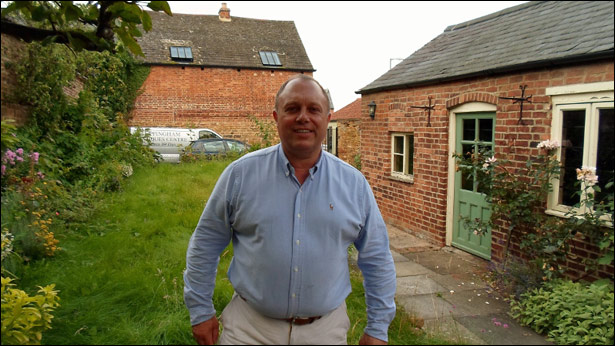
10 August 2012
Like a growing number of councils throughout the UK, Rutland County Council has recently adopted a policy applying S106 Developer Contributions towards affordable housing to all single self-build homes and large extensions. In most council area these charges have until now, traditionally only been applied where a property developer is building five or more homes.
Nick Grindley (pictured), a small business owner in Uppingham,Leicestershire, applied for planning permission to build a 187 sq. m townhouse in May this year and was asked to pay £50,000 in affordable housing contributions.
{TEASER}
Concerned by the level of the charges, Mr Grindley refused to sign the S106 agreement and his planning permission was refused. Since then, he has been lobbying the council to review the policy. He also contacted Alan Duncan, MP for Rutland and Melton, who has written to Roger Begy, the council’s chief executive, to express his concerns about the policy.
Mr Grindley said: “In most other local authorities the S106 policy only applies to developments of five or more dwellings. This makes sense as it applies to ‘developers’ making a short-term profit rather than individuals wanting to live in their own homes. But other local authorities, including mine, are interpreting the guidelines in their own way.”
“I’m currently reviewing my position regarding my application, but whether I chose to build my home or not, this is a matter of principle about unfair taxation – and not simply a case of sour grapes”.
Two dozen self build projects cancelled
He says that he is aware of three separate cases where the upfront payments required for planning permission were £35,000, £50,000 and £70,000. And, since beginning his campaign, he has been contacted by other self builders in a similar position and currently knows of at least 20 self build projects that have been cancelled since the policy came into force – but he says this is just the “tip of the iceberg”.
“This is in effect a punitive ‘roof tax’ which will kill self-build stone dead and also harm the local building trades. The figures are crazy. I know the council uses a viability formula to allocate this tax to affordable housing and general spending, but there is a difference between viability and achievability – a self-builder like myself doesn’t want to make a profit, they simply want to live in their home. The adopted policy in Rutland should be changed without delay.”
Chris Jones, spokesman for Rutland County Council said; “The new policy was introduced because the building of a new property leads to a greater demand on council services and the additional costs that brings. As population grows (as more houses are built) then greater demands are placed on things like schools and social services, town centre infrastructure, emergency services, and refuse and recycling collection. In isolation, one house does not seem to have much of an impact, but when you multiply that across all of the new properties built across the county it soon makes a significant difference.
“The soon-to-be-introduced Community Infrastructure Levy (CIL) requires all developments to contribute towards local infrastructure, and is worked out using the size and type of the development.
“As well as the above infrastructure contributions, the council agreed last year that all residential developments would normally be subject to the same criteria, requiring 35% affordable housing to be provided where viable on sites of any size. Previously, the requirement was for 20% affordable housing on sites of 15 or more homes. Rural exception sites are still required to be wholly for affordable housing.
“With smaller developments (five dwellings or less), it’s not always practical to request a percentage of affordable housing, so an affordable housing financial contribution can apply instead. This is based on the Council’s Affordable Housing Viability Study. This is approximately £804 per square metre, capped at a maximum of 85 sq. metres (£23,922).”
Mr Jones said that some self builders may believe they have exceptional circumstances which make the infrastructure or affordable housing contributions unfair. If so, they can submit their project to an independent economic test in order to get a neutral perspective over whether the proposed contributions are fair and viable. This can, in some cases, lead to a reduction or deferral of any payment due.
If you know of other councils that are applying charges for social housing on single self build projects, please let us know using the contact us links below.



